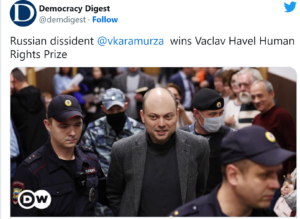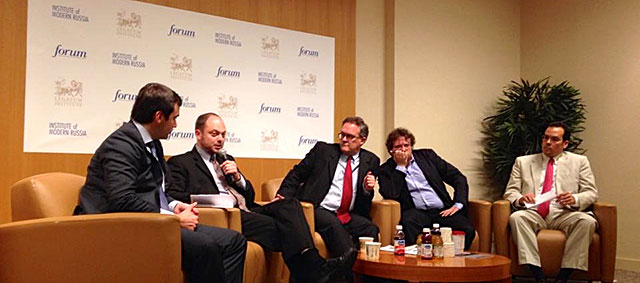The killing of Russian military journalist Vladlen Tatarsky has set off angry demands among politicians and commentators in Russia for the return of the death penalty, and for a merciless crackdown on dissent through greater use of terrorism and treason charges, CNN reports:
Tatarsky was killed when an improvised device exploded during an event in St. Petersburg on Sunday. A 26-year old suspect, Daria Trepova, is now in custody in Moscow and charged in connection with his death, under a section of the Russian criminal code that deals with terrorism…. On another popular Russian show called “60 Minutes,” one senior regional official, Andrey Gurulev, said he longed for the “days of Stalin…when the enemies of the people would get a pick and an axe and have fun waving it at a [Siberian prison camp].”
Russia has in effect turned fascist since President Vladimir Putin attacked Ukraine and mobilized his entire society for a genocidal war of aggression, claims Bloomberg analyst Andreas Kluth.
 The charge of high treason in Russia was broadened in 2012 to include consultations or any other assistance to a foreign state or international or foreign organizations. It is already being used against opposition activist Vladimir Kara-Murza, who has condemned Russia’s invasion of Ukraine, CNN adds.
The charge of high treason in Russia was broadened in 2012 to include consultations or any other assistance to a foreign state or international or foreign organizations. It is already being used against opposition activist Vladimir Kara-Murza, who has condemned Russia’s invasion of Ukraine, CNN adds.
It’s now a full year since political opposition leader, journalist, and historian Kara-Murza was arbitrarily detained near his home in Moscow after denouncing Russia’s war on Ukraine. Jillian Rolnick today took the floor on behalf of United Nations Watch (above) and appealed to UN member states to deny Russia a seat on the Human Rights Council, highlighting brave Russians opposing Putin’s regime, such as Kara-Murza.
On April 19 at 3:00 pm, the National Endowment for Democracy (NED), the Free Russia Foundation, George W. Bush Institute, Human Rights First, McCain Institute, and Raoul Wallenberg Center for Human Rights cohost a discussion about Kara-Murza’s current detention, mechanisms for his release, and the prospects for a free and democratic Russia. Register here.

Russian opposition activist Vladimir Kara-Murza, second left, speaks at the National Endowment for Democracy (NED).







